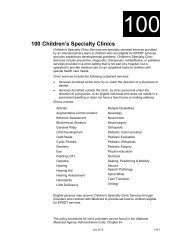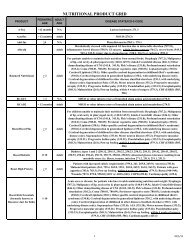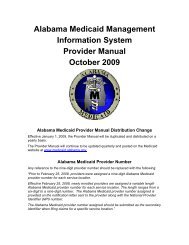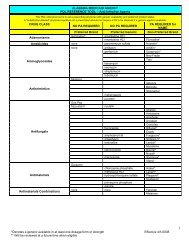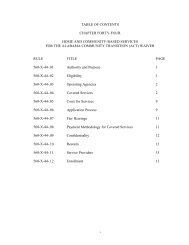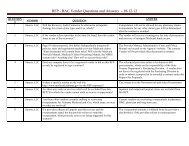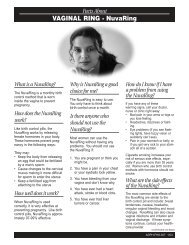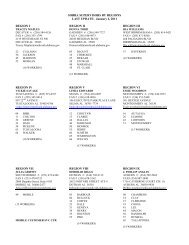TABLE OF CONTENTS CHAPTER TWENTY-EIGHT FORMS USED ...
TABLE OF CONTENTS CHAPTER TWENTY-EIGHT FORMS USED ...
TABLE OF CONTENTS CHAPTER TWENTY-EIGHT FORMS USED ...
Create successful ePaper yourself
Turn your PDF publications into a flip-book with our unique Google optimized e-Paper software.
<strong>TABLE</strong> <strong>OF</strong> <strong>CONTENTS</strong><br />
<strong>CHAPTER</strong> <strong>TWENTY</strong>-<strong>EIGHT</strong><br />
<strong>FORMS</strong> <strong>USED</strong> BY ALABAMA MEDICAID AGENCY<br />
RULE TITLE PAGE<br />
560-X-28-.01 Forms 1<br />
560-X-28-.02 Summary of State Law 4<br />
Regarding Advanced Directives
Chapter 28. Forms Used by Agency.<br />
Rule No. 560-X-28-.01. Forms.<br />
The following forms are presented as reference and to illustrate examples of each of the<br />
official forms referred to within the rules contained in the Alabama Medicaid Agency<br />
Administrative Code.<br />
(1) Plastic Identification Card.<br />
(2) Medicaid Monthly Eligibility Care (Social Security SSI Medicaid<br />
Certified Eligibles).<br />
(3) Examples of Termination Notices.<br />
(4) Alabama Medicaid RESTRICTED Eligibility Card.<br />
(5) Alabama Medicaid Recipient Restriction-Provider Notice.<br />
(6) Alabama Medicaid Recipient Restriction (Medical Referral of Restricted<br />
Recipient).<br />
(7) Certification and Documentation for Abortion.<br />
(8) Hysterectomy Consent Form PHY-81243 (rev.2-10-2010).<br />
(9) Sterilization Consent Form.<br />
(10) Form XIX-TPD-1-76, Medicaid Authorization Assignment.<br />
(11) Form HEW-641 (5/77).<br />
(12) Form HCFA-1561 (4/80).<br />
(13) Form XIX-HHC-DME-1. (Rev. 09/84).<br />
(14) Form XIX-SDT-3-72.<br />
(15) HCFA-1500 (1-84).<br />
(16) AlaMed 82-1, Revised 6-85, Appointment of Representative.<br />
(17) AlaMed 82-2, Petition for a Declaratory Ruling.<br />
(18) AlaMed 82-3, Petition for a Rule Change.
(19) Form LTC-2 (Revised 8/86).<br />
(20) Form XIX-LTC-3 Revised 6/92.<br />
(21) Form XIX-LTC-4 (rev. 82).<br />
(22) Form XIX-LTC-10 (Revised 4/94).<br />
(23) Form XIX-LTC-1 (rev. 82).<br />
(24) Form XIX-LTC-9 (rev. 2-84).<br />
(25) Reserved<br />
(26) AlaMed 82-4, Lien For Medical Payments Under Alabama Medicaid<br />
Program.<br />
(27) Referral and Treatment Plan, XIX-HHC-1-70 (Rev. 3/81).<br />
(28) Medicaid Home Health Start of Care Sheet, (SOC-1).<br />
(29) Medicaid Home Health Recertification, XIX-HHC-1-70-A (Rev. 10/81).<br />
(30) Medicaid Home Health Claim Form, MCD-6.<br />
(31) Medicaid Claim Inquiry.<br />
(32) Medicaid Monthly Eligibility Card for Recipients Enrolled in a Health<br />
Maintenance Organization.<br />
(33) UB-82<br />
(34) Eligibility Inquiry, MED-400.<br />
Author: Desiree Nelson, Program Manager, Medical Support<br />
Statutory Authority: Alabama Medicaid Agency Administrative Code.<br />
History: Rule effective October 1, 1982. Amended effective January 8, 1986;<br />
December 18, 1986; April 14, 1987; July 10, 1987; September 9, 1987; February 9, 1988;<br />
May 10, 1988. Emergency rule effective June 17, 1988; October 7, 1988. Amended<br />
effective October 12, 1988; January 10, 1989; April 17, 1990; July 13, 1991; March 13,<br />
1992; November 12, 1992; January 13, 1993; May 11, 1994; August 12, 1994.<br />
Amended: Filed May 11, 2012; effective June 15, 2012.
Rule No. 560-X-28-.02 Summary of State Law Regarding Advanced Directives<br />
Deciding about your health care<br />
If you are 19 or older, the law says you have the right to decide about your medical care.<br />
If you are very sick or badly hurt, you may not be able to say what medical care you<br />
want.<br />
If you have an advance directive, your doctor and family will know what medical care<br />
you want if you are too sick or hurt to talk or make decisions.<br />
What is an advance directive?<br />
An advance directive is used to tell your doctor and family what kind of medical care you<br />
want if you are too sick or hurt to talk or make decisions. If you do not have one, certain<br />
members of your family will have to decide on your care.<br />
You must be at least 19 years old to set up an advance directive. You must be able to<br />
think clearly and make decisions for yourself when you set it up. You do not need a<br />
lawyer to set one up, but you may want to talk with a lawyer before you take this<br />
important step. Whether or not you have an advance directive, you have the same right to<br />
get the care you need.<br />
Types of advance directives<br />
In Alabama you can set up an Advance Directive for Health Care. The choices you have<br />
include:<br />
A living will is used to write down ahead of time what kind of care you do or do not want<br />
if you are too sick to speak for yourself.<br />
A proxy can be part of a living will. You can pick a proxy to speak for you and make the<br />
choices you would make if you could. If you pick a proxy, you should talk to that person<br />
ahead of time. Be sure that your proxy knows how you feel about different kinds of<br />
medical treatments.<br />
Another way to pick a proxy is to sign a durable power of attorney for health care. The<br />
person you pick does not need to be a lawyer.<br />
You can choose to have any or all of these three advance directives: Living will, proxy<br />
and/or durable power of attorney for health care.<br />
Hospitals, home health agencies, hospices and nursing homes usually have forms you can<br />
fill out if you want to set up a living will, pick a proxy or set up a durable power of
attorney for health care. If you have questions, you should ask your own lawyer or call<br />
your local Council on Aging for help.<br />
When you set up an advance directive<br />
Be sure and sign your name and write the date on any form or paper you fill out. Talk to<br />
your family and doctor now so they will know and understand your choices. Give them a<br />
copy of what you have signed. If you go to the hospital, give a copy of your advance<br />
directive to the person who admits you to the hospital.<br />
What do I need to decide?<br />
You will need to decide if you want treatments or machines that will make you live<br />
longer even if you will never get better. An example of this is a machine that breathes for<br />
you.<br />
Some people do not want machines or treatments if they cannot get better. They may<br />
want food and water through a tube or pain medicine. With an advance directive, you<br />
decide what medical care you want.<br />
Talk to your doctor and family now<br />
The law says doctors, hospitals and nursing homes must do what you want or send you to<br />
another place that will. Before you set up an advance directive, talk to your doctor ahead<br />
of time. Find out if your doctor is willing to go along with your wishes. If your doctor<br />
does not feel he or she can carry out your wishes, you can ask to go to another doctor,<br />
hospital or nursing home.<br />
Once you decide on the care you want or do not want, talk to your family. Explain why<br />
you want the care you have decided on. Find out if they are willing to let your wishes be<br />
carried out.<br />
Family members do not always want to go along with an advance directive. This often<br />
happens when family members do not know about a patient’s wishes ahead of time or if<br />
they are not sure about what has been decided. Talking with your family ahead of time<br />
can prevent this problem.<br />
You can change your mind any time<br />
As long as you can speak for yourself, you can change your mind any time about what<br />
you have written down. If you make changes, tear up your old papers and give copies of<br />
any new forms or changes to everyone who needs to know.<br />
For help or more information:
Alabama Commission on Aging 1-800-243-5463<br />
Choice in Dying 1-800-989-9455<br />
Author: William O. Butler, III, General Counsel<br />
Statutory Authority: Alabama Medicaid Agency Administrative Code; Title XIX,<br />
Social Security Act; and §41-22-1 et seq., Code of Ala. 1975.<br />
History: Rule effective October 1, 1982, June 17, 1988, October 7, 1988, October 12,<br />
1988, January 10, 1989, July 13, 1991, March 13, 1992, January 13, 1993, and May 13,<br />
1994. Amended: Filed April 20, 1999; effective July 13, 1999.



